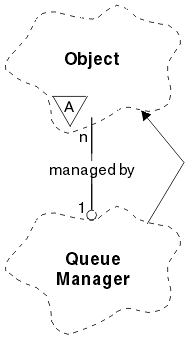
Figure 22. ImqQueueManager class

This class encapsulates a queue manager (a WebSphere MQ object of type MQOT_Q_MGR). It relates to the MQI calls listed in Table 23.
ImqAuthenticationRecord (see ImqAuthenticationRecord)
ImqChannel (see ImqChannel)
ImqObject (see ImqObject)
When an ImqQueueManager object is destroyed, it is automatically disconnected.
If there is a first authentication record, the chain of authentication records is used to authenticate digital certificates for secure client channels.
You can connect more than one ImqQueueManager object to the same queue manager. All use the same MQHCONN connection handle and share UOW functionality for the connection associated with the thread. The first ImqQueueManager to connect obtains the MQHCONN handle. The last ImqQueueManager to disconnect performs the MQDISC.
For a multithreaded program, each thread must use a separate ImqQueueManager object. Connections in different threads have different MQHCONN connection handles.
This method returns TRUE if successful. If it is called on an object that is not already connected, success is guaranteed.
MQRC_ATTRIBUTE_LOCKED
MQRC_ENVIRONMENT_ERROR
MQRC_FUNCTION_NOT_SUPPORTED
MQRC_REFERENCE_ERROR
(reason codes for MQBACK)
(reason codes for MQBEGIN)
(reason codes for MQCMIT)
(reason codes for MQCONNX)
(reason codes for MQDISC)
(reason codes for MQCONN)